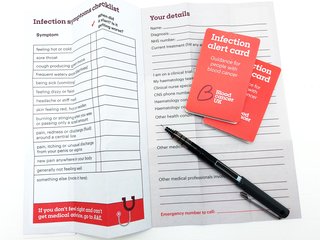Neutropenia and the risk of sepsis
What you need to know:
- Sepsis is a serious condition caused by an infection. It is an emergency and needs treatment straight away.
- People with blood cancer have a higher risk of developing sepsis.
- People with neutropenia are at particularly high risk of sepsis.
- Call 999 or go to A&E if you think you have sepsis.
Sepsis explained
Our immune system protects us from infection by fighting germs that can harm us.
Sometimes, the immune system goes into overdrive and starts attacking the body’s own cells as well as the harmful germs. It’s a reaction that affects the whole body and can lead to organ failure.
This is called sepsis. Other names for it are blood poisoning or septicaemia.
Sepsis is an emergency, but it can be treated with antibiotics. The important thing is to get medical help as soon as you can.
If you have blood cancer, you need know about sepsis. Anyone with an infection can develop sepsis, but it is more common in people with blood cancer. That’s because blood cancer and blood cancer treatment weaken the immune system. This is known as immunosuppression.
Sepsis symptoms
It’s best to treat an infection before it develops into sepsis. So get medical advice as soon as you notice any symptoms of infection, especially if you are neutropenic (you have a low level of neutrophils in your blood).
If you start to develop sepsis, you may experience one or more of these symptoms:
- Slurred speech or confusion
- Extreme shivering or muscle pain
- Passing no urine (in a day)
- Severe breathlessness
- It feels like you’re going to die
- Skin mottled or discoloured
Source: UK Sepsis Trust
On black and brown skin, mottled or discoloured skin (blotchy, grey, blue or pale skin) may be easier to see on the palms of the hands or soles of the feet.
If you have any of these symptoms, call 999 or get someone to drive you to A&E.
Symptoms can be mild
”When I got sepsis, I had very mild symptoms. It was actually some friends from a cancer charity I was talking to who told me to go to hospital. So it's good for you and everyone around you to know, if in doubt, act!”
Jess, diagnosed with Waldenström macroglobulinaemia in 2015

What is neutropenia?
If you have a low number of white blood cells called neutrophils, it’s particularly hard for your immune system to deal with infection.
This is called neutropenia, or being neutropenic.
Neutropenia can be caused by the blood cancer itself. It can also be caused by treatment, particularly chemotherapy, stem cell transplant, or immunotherapy.
A blood test called a full blood count will show whether you are neutropenic. Your neutrophil count is calculated as a number times 109 per cubic litre of blood. You might see it written as 1.5 x 109/L for example. The first figure is the important one:
- 1.5 or more is normal for many people of African or Middle Eastern heritage.
- 1.8 or more is normal for other ethnic groups.
- Less than these counts is neutropenic.
- You need to be particularly careful if your neutrophil count is less than 1.
- Under 0.5 is classed as severely neutropenic and you need to take extra special care.
See our information about preventing infection.
If you are not sure whether you are neutropenic, ask your hospital team or GP.

Order your free infection alert cards
With our pocket guide you can record infection symptoms and personal details to share with medical staff. Find out what to do and what to say if you go to A&E.
How to manage neutropenia
You may be told to be extra careful about infections while you are neutropenic. You may also be advised to adjust your diet while you are at risk. Follow the advice your doctor or nurse gives you.
Some people may benefit from medicine known as a growth factor or G-CSF. This can help with neutropenia by encouraging the bone marrow to make more blood cells, including white blood cells. Ask your hospital team if they think GCSF would help.
It may help to read our information about ways to manage your infection risk and making balanced decisions.
We also have information about eating safely with neutropenia.
Neutropenic sepsis
You can get sepsis if you are not neutropenic. It is more common if you are immunosuppressed because of blood cancer. It is particularly common if you are neutropenic.
There is a special name for this: neutropenic sepsis.
Get help immediately if you are neutropenic and think you have an infection. Call the 24-hour emergency number you have been given, or dial 999 and follow the advice.
Staff in accident and emergency departments should be aware of the dangers of neutropenic sepsis and know how to help. So it’s important to tell them you are neutropenic if you go to A&E.
See our information about What to say in A&E.
Others may be better judges
”The people that are close to you may have a more objective view of how you appear and how you behave. They're familiar with how you are normally, and if you behave out character, they probably have better judgement about how ill you are.
When I had sepsis, I downplayed the symptoms because I thought it was just a bad chest infection. My temperature was high and I was disoriented but I had no idea how serious it was. It was my husband who realised and called for help.”
Kat, diagnosed with double hit lymphoma in 2012

Treatment for sepsis
If you have sepsis, you should get antibiotics within one hour of arriving at hospital. This is likely to be through a drip into a vein in your arm.
You may need stay in hospital for treatment for a few days, occasionally longer. If you are having active treatment for blood cancer, you may need to stop treatment for a while. Your consultant haematologist (specialist doctor) is responsible for this decision. They will discuss it with the medical professionals treating you for sepsis.
When you are better, they will discuss any changes they need to make to your treatment plan.
Recovery from sepsis
Most people recover from sepsis. But the physical and mental effects can last for a few weeks or longer in some cases.
On our online community forum you will find people with blood cancer who have recovered from sepsis and can tell you what helped them, mentally as well as physically.
We also have information about coping with anxiety around infection and sepsis.
The UK Sepsis Trust has information about recovery from sepsis.
What to ask your hospital team
- Am I neutropenic?
- How long will I be neutropenic?
- Does my treatment put me at risk of sepsis?
- Who do I call if I have symptoms of infection or sepsis?
- What should I say if I call 999 or go to A&E?
- How do I protect myself from sepsis?
- Are there any activities I should avoid while I’m at risk?
